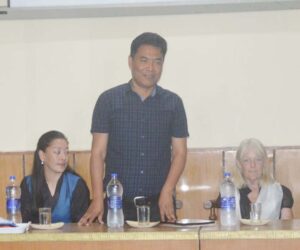
Tibet Charity India, Director Tsering Lhundup
Photo : Tibet Charity
Photo: Tibet Charity Faceboook
Tibet Charity was founded in Denmark in 1997 by Lakha Rinpoche, a lama and philosopher who is the spiritual leader of approximately 100,000 Tibetans in Batang, East Tibet. Mr Tsering Thundup, a former headmaster in Tibetan boarding schools in North India, fronts the NGO’s operations in Dharamshala.
During the Covid-19 lockdown this year, Tibet Charity is continuing its efforts to serve the community. Staff are on-site bagging up clothes to hand out to impoverished families in nearby slum areas. “We visited the slum near Kangra on July 6th, His Holiness’ birthday to distribute rations to the residents of a slum near Kangra,” Tsering says, “We saw that there were many children there without clothes. So we set up this clothing drive. We will distribute clothes to the families based on need. Each family will get one of these bags that you can see here.” Tsering points to some large sacks full of clothes. Donated clothes are strewn across the classroom floor. “There was a good response from the public, many donations.”
This is just one of Tibet Charity’s social development initiatives. They also provide sponsors for people with no source of income, with a particular focus on the elderly and monastics. Distribution of winter clothes and food items is a staple of Tibet Charity’s work in the community.

Tibet Charity nurse looking after elderly Tibetans
Photo: Tibet Charity
Other work includes a blood donation programme inspired by Tsering’s own experience when his mother was taken ill and required a transfusion. “It was difficult to source donors,” he explains, “there was no network or infrastructure in place.” Hence, Tsering decided to start a club of donors in the local area. There were once 300 donors but this number has reduced in recent years as the Tibetan population has started to dwindle. “The elders are passing on,” Tsering says, “and many of our donors are moving to the West, but we still have something going.” Nurses employed by Tibet Charity take care of the donors during and after they make their donation, providing transportation and aftercare.
These nurses also travel around the local community offering assistance to the elderly. There are currently four nurses at Tibet Charity engaged in daily home visits to the neediest members of the population in Dharamshala. They bathe them and shop for food, a service which is particularly crucial during the ongoing pandemic.

Supporting locals who also help in looking after dogs
Photo: Tibet Charity
A major focus of Tibet Charity’s work is their animal care programme, launched in 2006. At that time there was a spate of cases of street dogs biting people and local livestock. Some of the dogs were rabid and one bit a member of the Tibet Charity staff. Tibet Charity decided to take on the situation in a more humane way. Every year in September, after World Rabies Day, Tibet Charity leads a mass vaccination campaign to control rabies. Roughly one thousand dogs are vaccinated under the programme every year and reports of rabid dogs have reduced substantially in recent years. Tibet Charity also runs a sterilisation campaign to help stabilise the stray dog population in the area. This programme attracts some controversy but Tsering believes it is necessary to maintain the ecological balance.
Tsering comments on the situation where people take stray dogs under their wing during their time in McLeod. He says that he prefers people, especially those who are here just for a short period of time, to feed the dogs on the street without taking them away from their natural habitat. “Keeping these dogs as pets at home tends to become problem for the dog as they become habituated to get food fed to them rather than fending for food themselves,” Tsering explains. “When people who keep such dogs as pets leave the place, these dogs are either abandoned or we are called to take them under our care which is not possible because of the limited space we have. These dogs forget how to survive when they are cared for temporarily. On top of that, it is difficult for them when they return to the streets as they are seen as encroachers by other dogs who already live in the area.”
Tibet Charity sent three dog catchers for training in Sikkim. After tutelage under some of the world’s greatest dog catchers in the high Himalaya, these fully ordained canine capturers have now returned to ensnare and then sterilise or vaccinate the local dog population in the McLeod, Bhagsu and Naddi area. Tibet Charity has also organised Animal Birth Control camps in places outside Dharamshala as well. They have worked in Poanta Sahib, Bir and Mandi ,and every year they travel to Bodhgaya to take part in a sterilisation programme there. All in all, Tsering believes that the dogs in McLeod Ganj are calmer than those elsewhere.

Clothing donation drive
Photo: Tibet Charity
English classes at Tibet Charity are currently on hold during the pandemic but usually take place year-round. As a former school teacher, Tsering has taken great interest in this area. Tibet Charity has its own textbooks produced by English language instructors from Canada. One regular Tibetan bilingual teacher is employed and volunteers are hired from abroad to teach for periods of at least three months. Tibet Charity only hires qualified TEFL (Teaching English as a Foreign Language) instructors as volunteers and the three-month requirement means that the students have a chance to build a rapport with their teacher.
Outside his office, Tsering points out a pile of PPE (personal protective equipment used for protection from coronavirus) equipment. “When they opened the bus routes again, we distributed masks to all the drivers. This lot is going to go to the police officers on the front lines.” Until normal service resumes Tsering has found a way to keep Tibet Charity active as a positive force in the community.




 Print
Print Email
Email













